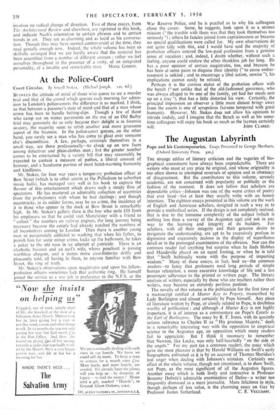The Augustan Labyrinth
Pope and his Contemporaries. Essays Presented to George Sherburn. (Oxford University Press. 3os.) THE strange eddies of literary criticism and the vagaries of bio- graphical assessments have always been unpredictable. There are writers who must at any price be original, and whose originality is too often shown in attempted reversals of opinion and in obstinacy of disagreement. But the contributors to this volume, serenely academic, are not concerned with popularity or publicity or the fashion of the moment. It does not follow that scholars are dependable critics-.Johnson was one of the worst critics of poetry that ever lived—but at least they usually write with an honest intention. The eighteen essays presented in this volume are the work of English and American scholars, designed in such a way as to provide a methodical series. If the design is not completely realised, that is due to the immense complexity of the subject (which is nothing less than a survey of the Augustan age) and not in any way to the learning and integrity of its builders. For scholars, with all their integrity and their genuine desire to invigorate the understanding, are apt to be excessively profuse .in digression and excessively zealous in the display of superfluous detail or in the prolonged examination of the obvious. Nor can the common reader feel anything but surprise when he finds Hobbes and Mandeville placed on an equal footing, or when he is told that "Swift habitually wrote with the purpose of imparting wisdom." Many of these essays, in fact, lead us—the common readers—to fancy that professors need long periods of simple human relaxation, a more excursive knowledge of life and a less passionate adherence to the printed or written page. The literary analysis of writers, especially by those who are teachers rather than writers, may become an extremly perilous pastime.
The novelty of this volume is the publication for the first time of a manuscript entitled A Master Key to Popery, transcribed by Lady Burlington and almost certainly by Pope himself. Any piece of literature written by Pope, or closely related to Pope, is doubtless worthy of publication ; and although A Master Key is not highly important, it is of interest as a commentary on Pope's Epistle to the Earl of Burlington. The essay by R. F. Jones, with its quaintly serious reference to Charles II as "His gracious Majesty," deals in a remarkably interesting way with the opposition to empirical science in the Augustan age, an opposition which many readers fail to appreciate. But I think it necessary to remember that Newton, like Locke, was only half-heartedly "on the side ot the angels." For my part (as a common reader), the essay which gave me most pleasure is that by Harold Williams on Swift's early biographers, enlivened as it is by an account of Thomas Sheridan's just anger when dealing with Johnson's mistakes. Certainly one effect of the whole volume, though not intentional, is to show Swift, not Pope, as the most significant of all the Augustan figures. AnOther essay which is both lively and instructive is Professor Bonamy Dobrde's admirable examination of Defoe—a writer too frequently dismissed as a mere journalist. More felicitous in style, though L perhaps of less value, is the charming essay on Gay by


































 Previous page
Previous page